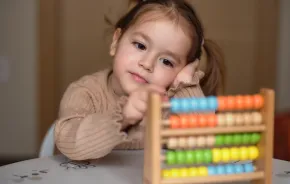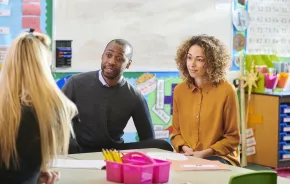Kids don’t classify their play as “fun” or “learning,” the way adults sometimes do. Toddlers absorb numbers, colors and letters while they practice their large motor skills stacking brightly hued blocks. They’re intent; they’re compelled; they’re obviously enjoying themselves. Elementary-age kids play a math game and expand their number sense without feeling as though they’re doing drills in school. Older kids can work with a science kit, and they’re not necessarily thinking about the fact that adults consider that topic “educational.” They’re just having fun exploring a subject they enjoy.
So while we recognize that play is educational, we’ve gathered a number of gift ideas that help develop kids’ skills in academic areas such as reading, math or the sciences. We consulted local toy stores to get the scoop on what they love this season, from sweet tot toys to impressive science kits to family games, with an emphasis on toys made from sustainable materials in countries with high safety standards. We’ve included one of our favorite toys, too.
Little ones
Toddler Wobbler (Brio, $39.99, ages 1 and older). Learning to walk opens up a whole new world of learning possibilities for kids. This brightly colored first walker is sturdy and lets kids push very important cargo around the house. (Wind Up Here)
Lift-Off Rocket (IPI, $39.99, ages 18 months and older). Young kids can start learning about space exploration with this multiple-award-winning play set that features a lift-off sequence and realistic rocket sounds, three play areas and figures that include astronauts, a space dog, a dune buggy and a moon crater. (Curious Kidstuff)
Let’s Have a Playdate with Brahms (Music Shine Media, $14.95, ages 2 and older). Tots don’t know Brahms from Barney — they just know that they can play hide and seek, sing and march to the classical music on this DVD by local children’s musicians Let Your Music Shine with Lisa and Linda (formerly Identical Harmony), who also host the Seattle Symphony’s Tiny Tots! classical music series. (Borders)
Flash of Brilliance flashcards (Flash of Brilliance, $12, ages 3 months-9 years). Younger kids learn everyday words and concepts by using these durable, colorful flash cards. Older kids can explore basic facts about bugs, space and dinosaurs in a visually stimulating, easy-to-remember way. (Pinocchio’s Toys)
Water Blocks (Plan Toys, $25.99, ages 3 and older). Produced from rubberwood by a company that Dragon’s Toy Box calls “one of the most ecologically and socially conscious companies around,” these beautiful blocks help young kids develop motor and spatial skills while honing their color recognition. (Dragon’s Toy Box)
Smart Splash (Learning Resources, $16, ages 2 to 4). This series of bath toys helps kids learn their shapes, numbers and colors, using appealing duck, turtle and penguin figures. (Teaching Toys and Books)
Cariboo (Cranium, $16.95, 3 and older). Finding a game that appeals to all ages can be difficult, but even preschoolers can play this cooperative game, in which they match colors, shapes, numbers and letters in a search for hidden balls. (Blue Highway Games)
Planet Sensory Game (Haba, $36.99, ages 4 and older). This collection of 12 games for two to four players takes kids on an exploration of a new planet. Questions about what they see, taste, touch and smell helps stimulate perceptual development. Made in Germany. (Planet Happy)
Sequoia Wildlife Finger Puppet Playset (Folkmanis, $39.95, ages 3 and older). Six beautifully made wildlife puppets live in a 17-inch plush sequoia tree. Kids can learn about conservation and animals while developing communication skills. Puppets include an owl, bear, blue jay, squirrel, hare and fox. Net proceeds of the sale of this toy benefit the Sierra Club. (Planet Happy)
Terra Kids Monocular (Haba, $30.95, ages 4 and older). A field tool for kids that’s made with glass lenses, not plastic, and includes a mini-compass and carrying case. Children can magnify bugs and other animals up to 10 times, learning the observation and classification skills that are the basis of science education. (Planet Happy)
Exploring Math (Haba, $20-$30, for pre-K through grade 1). This block set, based on the philosophy of Friedrich Froebel, the creator of the first kindergarten, introduces young kids to early math skills. Colors and shapes help kids learn patterns, logic and counting. (Teaching Toys and Books)
School ages
Science kits (Thames + Kosmos, $14.95-$99.95, ages 5 and older). Extremely high-quality science kits introduce kids to basic principles of motion, energy, physics and other science topics. (Top Ten Toys)
Crane building set (Baufix, $22.99, ages 3-6). The crane building set (and other building sets from German company Baufix, which range in price from $15.99 to $99.99) allows kids to discover simple principles of physics and mechanics. The sets are versatile, easy to work with and made in Germany from domestic German wood. (Dragon’s Toy Box)
Maask (Blue Orange, $19.95, ages 6 and older). In this award-winning board game, kids practice abstract math skills by hiding colored spacers around the circular board, then counting backwards to figure out where the spacers have been hidden. (Top Ten Toys)
Pickomino (Rio Grande, $24.95, ages 7 and older). Math takes a silly turn in this dice game, which casts players as birds collecting worms for a barbecue. Roll a high enough score to take a domino, but if you’re not careful, you’ll go bust. (Blue Highway Games)
Snap Circuits Jr. (Elenco, $29.99, ages 8 and older). This is a beginning electronics set that introduces kids to the basics of the field, plus reading diagrams and following directions, by way of more than 100 experiments in the companion manual. (Wind Up Here)
Da Vinci Challenge (Briarpatch Games, $24.99, ages 8 and older). Math, art and history come together in a strategy game based on the Egyptian Flower of Life pattern, which Leonardo da Vinci studied and used in his drawings. (Teaching Toys and Books)
Bananagrams (Bananagrams, $15.95, ages 7 and older). This word game is sort of like Scrabble, with a twist — there’s no board and you don’t take turns. Use your letters as fast as you can to make your own crossword puzzle. (Blue Highway Games)
The Girl’s Like Spaghetti by Lynne Truss (Putnam, $16.99, ages 9-12). The sequel to the kids’ version of grammar book/rant Eats, Shoots, and Leaves uses drawings to illustrate the vital importance of apostrophes and commas to clear writing. (Teaching Toys and Books)
The Nobel Book of Answers, edited by Bettina Steikel (Atheneum Press, $17.95, elementary ages and older). Twenty-one Nobel Prize laureates answer kids’ questions, such as “How much longer will the earth keep turning?” and “Why does 1+1=2?” Even middle school and high school students will find the questions — and thoughtful answers — fascinating and informative. (Teaching Toys and Books)
WoodsWalk by Henry W. Art and Michael W. Robbins (Workman Pub., $14.95, ages 9-12). Young naturalists can read about all of the regions in North America, across the four seasons, and find out what’s growing in the wild, and who lives there. Kids get tips on using their senses to gather information outdoors, plus identification information and a pocket-sized leaf and tree spy guide. (Planet Happy)
ParentMap Gift Pick
We love Xeko’s Mission: Indonesia, a new trading-card game
that introduces kids to the amazingly diverse critters of Sundaland. It
comes in a cool box, the company is based in Seattle and it helps raise
kids’ awareness of the planet’s biodiversity hotspots — endangered
areas filled with wildlife. Players practice math skills and learn
science and natural history as they compete against each other during
the game, using vividly illustrated animal cards they can collect and
trade.
The game comes packed in a neat wooden box, which means you
don’t have a lot of packaging to throw away, and what little packaging
that does come with the game is made out of recycled materials and
soy-based inks (cards, too). Inventor Amy Tucker wanted to focus
attention on the planet’s endangered habitats and the problem of global
warming, and 4 percent of the game’s net sales are donated to nonprofit
Conservation International. This is the third game in the series; the
first two focus on Madagascar and Costa Rica. $29.99, booster packs
$3.99. Available at local toy stores and Whole Foods Markets. For locations, visit the Xeko website.
Our gift gurus
Blue Highway Games, 2203 Queen Anne Ave. N., Seattle. 206-282-0540
Curious Kidstuff, 4740 California Ave. S.W., Seattle. 206-937-8788
Dragon’s Toy Box, 1525 First Ave., Seattle. 206-652-2333
Pinocchio’s Toys, 4540 Union Bay Place N.E., Seattle. 206-528-1100
Planet Happy, 2914 N.E. 55th St., Seattle. 206-729-0154
Top Ten Toys, 104 N. 85th St., Seattle. 206-782-0098
Wind Up Here, 121 Fifth Ave. S.E., Olympia. 360-943-9045
Originally published in the November, 2007 print edition of ParentMap.











